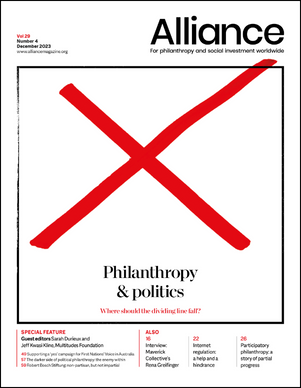Ensuring the body-politic remains healthy, rather than treating it when it is sick, should be the aim of philanthropy
Popular narratives in contemporary philanthropy concentrate on solving complicated social problems while changing the systems that give rise to these problems. Yet, this philanthropic ambition is hugely demanding for the initiatives supported by philanthropic funding as they are supposed to identify problems, and develop and implement solutions while demonstrating that they change systems. In a recent Stanford Social Innovation Review article, Christian Seelos suggests a ‘Zero-Problem Philanthropy’ approach, which shifts from reactive symptom-solving to creating a healthy context that prevents problems from arising in the first place. We suggest that philanthropy aimed at creating a healthy context requires philanthropies to be clear about their role in affecting change in political systems.
 Credit: Unsplash
Credit: Unsplash
Democracy, widely considered a political system which ensures a healthy context within which social and economic progress can take place, is under attack worldwide. The rise of populist non-democratic movements, growing polarisation, and a general decline in citizen participation underscore the need for attention to democracy as our society’s operating system. Rather than treating democracy as a patient in need of healing and inadvertently reinforcing existing divides, the role of philanthropies needs to shift towards making democracy future-fit. The emerging field of political innovation offers an opportunity for philanthropies to rethink their engagement with democracy and politics. We define political innovation as the citizen-led practice of identifying problems in the political system and collectively working towards solutions to uphold and rejuvenate democracy. Political innovation as a practice makes it clear that social change and political change are interrelated – not decoupled.
Subscribe now from only £45 a year!
This article is only available for our subscribers
Existing users can login here



